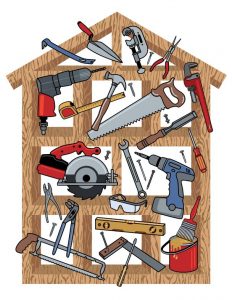Last week I posted a list of 17 things that could be potential deal breakers in your life on a little tropical island. If you started laughing hard at some of my descriptions, you are made for island life. If most of the points made you cringe or gave you the shivers, you may reconsider relocating to a tropical island paradise.
Today I am giving you the exact same list, but this time I will tell you why most of them are the BEST reasons to come and live on Little Corn Island:
1.The Heat: I love the heat, because I love the sun! I always feel a lot of affinity with the iguanas we have here. They only come out when the sun shines. They first have to warm up, before they can become active. I’m just like that. Inactive in the cold, active in the heat. Although you won’t find me sunbathing on the beach, I always say I was born in the wrong location. In the Netherlands I was often cold, and very miserable in wintertime, when blankets of cold grey dampness do anything but make you feel comfortable or lift your mood. The sun is hidden by that ominous dark layer, sometimes for weeks at a time. The landscape looks grey and brown and dead, without any colour to brighten up your day. Only in my thirties I learned there was a name for my yearly depression: Seasonal Affection Disorder. Living on a little tropical island, seeing the sun almost every day and feeling warm most of the time has totally fixed that problem. Temperatures never drop below 20 Celsius (68 Fahrenheit) and are usually up around 25 in the shade (high seventies). The climate forces you to be outside in the fresh air all the time, instead of being locked up in air-conditioned or centrally heated sealed spaces. Having your house all open and being outside all the time also makes the whole island community more welcoming and open. No huddling behind closed curtains to keep the cold out. And thanks to that year-round warmth, Mother nature is always showing herself in her brightest greens and colourful flowers, against the backdrop of turquoise seas and blue skies. Nothing more uplifting for your mood than a dash of bright colour! Oh, and the sweat? Just see it as if you’re working out all the time: a major boost for self esteem and feeling accomplished.
 2. The Rain: OK, I confess, sometimes I have to force myself to love the rain. But imagine the first rains after months of dry hot weather. It is the most refreshing thing ever. I will take rain-showers, literally just standing outside washing myself in the downpour. It’s a most invigorating and super fun experience, and both my skin and hair love it! The rain saves you work, because you don’t have to water all your plants, and you can catch the water running down from the roof to water those that are not exposed, and to wash your laundry. Your clothes just feel and smell different when they have been washed with rainwater. As annoying as rainy season can be, with days of intermittent showers and squalls or 24 hours continuous downpours, we have to be grateful for all that water. It replenishes our aquifer and allows us to live on this little rock. We are totally dependent on the rains for all our daily water use. And after all the heat and sweat and always being outside, sometimes it is nice to be forced by the rains to go inside and do something indoors, without having sweat running down your spine. You have to love the rain!
2. The Rain: OK, I confess, sometimes I have to force myself to love the rain. But imagine the first rains after months of dry hot weather. It is the most refreshing thing ever. I will take rain-showers, literally just standing outside washing myself in the downpour. It’s a most invigorating and super fun experience, and both my skin and hair love it! The rain saves you work, because you don’t have to water all your plants, and you can catch the water running down from the roof to water those that are not exposed, and to wash your laundry. Your clothes just feel and smell different when they have been washed with rainwater. As annoying as rainy season can be, with days of intermittent showers and squalls or 24 hours continuous downpours, we have to be grateful for all that water. It replenishes our aquifer and allows us to live on this little rock. We are totally dependent on the rains for all our daily water use. And after all the heat and sweat and always being outside, sometimes it is nice to be forced by the rains to go inside and do something indoors, without having sweat running down your spine. You have to love the rain!
3. The Wind: ahh, the wind! Here it is called a “sweet breeze”, and what better name for that cooling breeze coming from the sea, to keep you from coming to a full boil around midday. The breeze dries all your laundry in no time, and also keeps the mosquitoes at bay, that’s why you want to live on the windy side of the island. Those of you familiar with Ayurveda will understand when I say that for Vatas the windy season may be a little aggravating, but with the right foods, a thin wrap around your shoulders and some extra stretching it is still ten times better than winter up north.
4. The Transport: oh well, there’s a lot to be said that is not in favour of our transportation system to and from the island. But on all the good days, a ride in that open panga is the best way to come home to our little island. You make friends on the way, see a beautiful sunset over your shoulder, while craning your neck to catch a glimpse of your destination. On an early morning ride out to the Big Island, I meditate under the rays of the sun, not yet too hot, feeling the rhythm of the boat against the waves resonate with my own heart beat. The wind blowing your hair out of your face, the spray from the bow making beautiful shimmering arches. Ahh, I love those panga rides!
5. The Erosion: well, there is nothing to be loved about that. It is horrific and makes us all very sad and scared. Businesses are close to falling into the sea in some places, people are losing part of their properties, the island is getting smaller with every storm. On the opposite side of all that material loss is the impressive power of Mother Nature. You gotta give it to her: maybe we humans are bad to her, but she is a badass herself, throwing right back at us all that we have done wrong. When a good high sea backed by a strong wind washes the sea water over the vegetation into the beach trail, leaving us with ankle deep water full of trash and debris to wade through, I cannot help but think: right on, girl, thanks for rubbing it in.
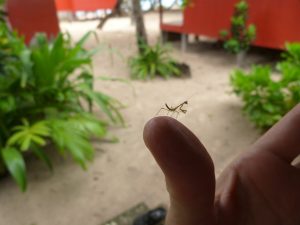 6. The Bugs: they are beautiful! At least, quite a few of them. Colourful butterflies, amazing moths, bright red dragonflies, bright green grasshoppers, the most amazing beetles, caterpillars and (tiny) praying mantises, and have you ever taken a good look at a cockroach? It’s actually quite a beautiful creature. So is a tarantula. We have banana spiders here who have a miniature skull face painted on their backs. Ants have intricate ways of communicating and working together, never giving up their tasks. Watching a mosquito from close by, seeing how it lifts its hind legs, is quite interesting. But then you just smack them on the head. Mosquitoes and sand flies offer excellent training in letting go. Letting go of wanting to be in control, because you can’t. Letting go of being annoyed by their high pitched buzz, because you can’t stop them. Letting go of the need to scratch an itchy bite, because you will cause it to get infected (you can stop yourself). Thank you bugs, for providing us with multiple reminders to let go and relax.
6. The Bugs: they are beautiful! At least, quite a few of them. Colourful butterflies, amazing moths, bright red dragonflies, bright green grasshoppers, the most amazing beetles, caterpillars and (tiny) praying mantises, and have you ever taken a good look at a cockroach? It’s actually quite a beautiful creature. So is a tarantula. We have banana spiders here who have a miniature skull face painted on their backs. Ants have intricate ways of communicating and working together, never giving up their tasks. Watching a mosquito from close by, seeing how it lifts its hind legs, is quite interesting. But then you just smack them on the head. Mosquitoes and sand flies offer excellent training in letting go. Letting go of wanting to be in control, because you can’t. Letting go of being annoyed by their high pitched buzz, because you can’t stop them. Letting go of the need to scratch an itchy bite, because you will cause it to get infected (you can stop yourself). Thank you bugs, for providing us with multiple reminders to let go and relax.
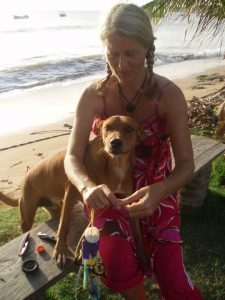 7. The Dogs: they are so much fun! Most island dogs run around free, and choose whom they want to hang out with for the day. They may be your best friend for a couple of days, until they run into someone else that all of a sudden becomes their preferred company (probably a better bite from a hamburger). Most dogs have names, and we all know them by their name. So we greet all dogs just like we greet each other. They are an integral part of the island community, are allowed in most restaurants, feature in lots of tourist’s pictures, get their own Facebook pages and are missed by many when they pass away. I’m a cat person, but I love the simplicity of dogs too.
7. The Dogs: they are so much fun! Most island dogs run around free, and choose whom they want to hang out with for the day. They may be your best friend for a couple of days, until they run into someone else that all of a sudden becomes their preferred company (probably a better bite from a hamburger). Most dogs have names, and we all know them by their name. So we greet all dogs just like we greet each other. They are an integral part of the island community, are allowed in most restaurants, feature in lots of tourist’s pictures, get their own Facebook pages and are missed by many when they pass away. I’m a cat person, but I love the simplicity of dogs too.
8. The Aquifer: Not much to rejoice about an aquifer in itself, but the fact that it is limited makes you very aware of the amount of water that you use every day. Once you become aware of the possibility that the aquifer gets depleted, every drop of water plays a trick on your conscience. You learn to conserve water, recycle it, catch it. It definitely contributes to mindfulness and conscious and creative living!
9. The Trash: another one that is hard to be liked. Trash everywhere. Always washing up more on the beach, from all around the world. Always a stinking, burning pile of household trash somewhere close to you, unless you live smack on the beach, upwind from everyone. Always trash lying around everywhere, since a lack of education has not taught a good part of the local population that trash does not belong in nature. Besides: we have nowhere to go with it. Still, there are good things to be said about trash and little tropic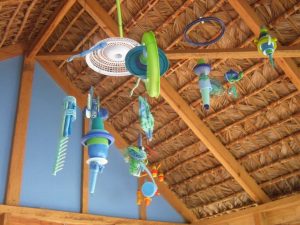 al islands: for a lot of us living here and being responsible for our own trash has made us very conscious of it. Some of us have started to shop more consciously, looking for things in bulk, creating less trash. I personally have let go of most processed foods, to avoid trash. So in a way I can thank trash for a healthier diet with mostly whole foods. It also makes us more resourceful, finding creative ways to recycle it, like stuffing soft plastics in cushions for the beach, or reusing PVC-pipes used for pouring cement posts to organise T-shirts in the gift shop. I have made a lot of fun things out of beach trash, and it is my way of not getting totally sad and upset about all that rubbish sitting on the beach. Watching the giant Karma Shack mobile made of beach trash slowly doing its never-ending choreography makes a lot of people feel good.
al islands: for a lot of us living here and being responsible for our own trash has made us very conscious of it. Some of us have started to shop more consciously, looking for things in bulk, creating less trash. I personally have let go of most processed foods, to avoid trash. So in a way I can thank trash for a healthier diet with mostly whole foods. It also makes us more resourceful, finding creative ways to recycle it, like stuffing soft plastics in cushions for the beach, or reusing PVC-pipes used for pouring cement posts to organise T-shirts in the gift shop. I have made a lot of fun things out of beach trash, and it is my way of not getting totally sad and upset about all that rubbish sitting on the beach. Watching the giant Karma Shack mobile made of beach trash slowly doing its never-ending choreography makes a lot of people feel good.
10. The Limited Availability of Basic Things: love that one! The lack of choice is so liberating. When you need new shorts, and the store has only two pairs of cotton shorts that are not jeans and full of bling, you don’t mind that one is a size too big, and the other not really a colour that you’d normally wear. You just buy them! When you start to think about it, mod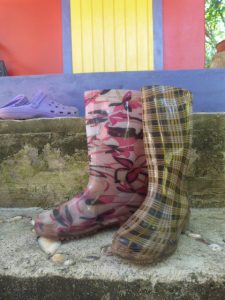 ern life is a daily struggle of choices, taking up a lot of your time. All day long. A lot of them are choices about stuff that you buy to wear, to use, to eat or drink. On a little tropical island there is not a whole lot to choose from, and it leaves you with lots of time and energy to do other things, or think about other things. The realisation that you won’t die when you don’t get your favourite coffee, your preferred sweet rolls or flip-flops that match your bathing suit, means that you are growing away from a highly materialist life of having, and start to get more into the mode of just being (I even have a pair of non-matching rubber boots). If you can handle the limited availability of basic things, you have passed one of the main rites of passage for life on a tropical island (in my Christmas 2016 post I wrote about ‘being vs having’ as an essential characteristic of island life).
ern life is a daily struggle of choices, taking up a lot of your time. All day long. A lot of them are choices about stuff that you buy to wear, to use, to eat or drink. On a little tropical island there is not a whole lot to choose from, and it leaves you with lots of time and energy to do other things, or think about other things. The realisation that you won’t die when you don’t get your favourite coffee, your preferred sweet rolls or flip-flops that match your bathing suit, means that you are growing away from a highly materialist life of having, and start to get more into the mode of just being (I even have a pair of non-matching rubber boots). If you can handle the limited availability of basic things, you have passed one of the main rites of passage for life on a tropical island (in my Christmas 2016 post I wrote about ‘being vs having’ as an essential characteristic of island life).
11. Lack of Proper Healthcare: this is an interesting one. When you know there is not really a reliable medical service, you become more resourceful in finding out on your own what could be wrong with you, and then finding natural treatments for it, instead of pharmaceutical remedies that are sometimes not available anyway. But you also let things just take their course more often. When you get sick, well, you just wait till you get better, instead of running to the doctor for some pills. You start to rely less on someone else taking care of your health, and become more responsible yourself. In all these years on the island I have visited the clinic once. Living a proper stress free island life also makes you less prone to disease.
12. Lack of Communication: the lack of reliable telephone and internet signals has made me very independent of my phone, and of my need to stay connected with people in other parts of the world. When I can, I will, when I can’t I won’t cry over it. As I write this it is noon, and I just realised that I have forgotten to turn on my phone this morning! (and I am still alive!). When I am in the middle of posting a blog and the internet blacks out, I just go rake the garden or walk along the beach. Having unreliable communication can also be a great excuse to not stay in touch, or not get any work done! I sometimes dream of making our little island a digital detox destination. DDD, I’d love to offer that in the Karma Shack!
13. Limited things to do: bullshit. I never have enough time to read all the books I want to read, study all the topics I want to study, write all the posts I have in my head, make my garden look perfect, finish all those arts&crafts-projects, and make all those home-cooked goodies that I’d like to eat, just because I am too busy with island-life as it is, and I don’t mean work. Boredom is a choice, and it’s not mine.
14. Temptations: that can be a tough one for some. But it can also be your real challenge. Staying true to your choice to live a life free of addictive substances that are toxic for you in many ways, is a very empowering experience. Especially when you are surrounded by people who are daily users of one for more of them.
15. The Tourists: Love them or leave the island! So many wonderful people from all over the world come to our little island. And they are all here to have a good time, so as soon as you contribute to that, they are your best friend forever! I have met so many interesting people through my work in the Karma Shack, from submarine engineers to drummers in famous bands, ayurveda specialists and acupuncturists, young families travelling with 3 little kids, and double breast cancer survivor 85-year olds still swimming everyday. A guy that made a living of carving wooden spoons and teaching people how to do that, with a raw vegan chef as his girlfriend, whom he asked to marry here on the island. A woman who teaches yoga to children with special needs. War veterans, relief workers, missionaries. Wonderful musicians share their talents, artists leave their paintings, and many a tourist will spend a couple of hours leaving our beaches cleaner than before. Some of the tourists come back and become part of our community for a few weeks or months every year. These people become our favourite pack-horses to lug special requests from the US and Canada down here for us. Tourists! So grateful they come here!
16. The Local Community: a local island community is always a fun mix of many. Because even the locals come from all over the place, and add to that your mix of foreigners settling here after they have arrived as tourists. Once tourism starts to offer a good amount of jobs you see the local and foreign community mix more and more. Living in a place like this you get to have friends from all over the world. Apart from Nicaraguans both from the island and from the mainland, we have French, Italian, British, Irish, Portuguese, German, Austrian, Swiss, Spanish, Norwegian, Israeli, Argentinian, Australian, Kiwi, US, Canadian, Salvadoran, Colombian and Syrian people living on our little island. To this day I am still the only Dutch resident here, phew!
The local community provides a never ending course of life-lessons. More than anything you learn that the way they do things in your country, is not the way they do things in any other country, and especially not on your little island. You learn to open your mind to different ways, and accept that things cannot always go your way, simply because you’re not at home.
17. The confrontation with self: a great point if you’re into personal and spiritual growth! Being in unfamiliar surroundings with a lot of common things missing, out of your comfort zone, not surrounded by your closest family and friends that are always there for you and put up with your quirks or moods when necessary, you get to face yourself in the mirrors that random strangers will hold up for you, not knowing you so well. What you see in that mirror might not be your most favourite you, but then you can start working on it, and grow into a better version of yourself. Enjoy the ride!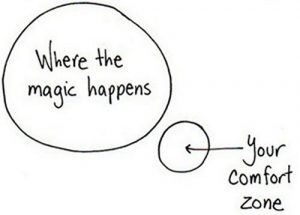
So here we have the exact same list that I presented last week as 17 good reasons why you DON’T want to live on a little tropical is
land. Today I turned them around and made them perfect reasons why you DO want to live here. Last week’s list was based on all sorts of fears, keeping us in our comfort zones, today’s list is based on love, challenging us to step out of that comfort zone and learn new things and have different and magical experiences. That is always your choice in life: do I think, speak, act and live from a place of fear based on discomfort, uncertainties and the unknown, or do I live from a place of love, based on a willingness to learn and grow? Take that thought with you when you pack your bag to come and visit us and check out our little island for yourselves!
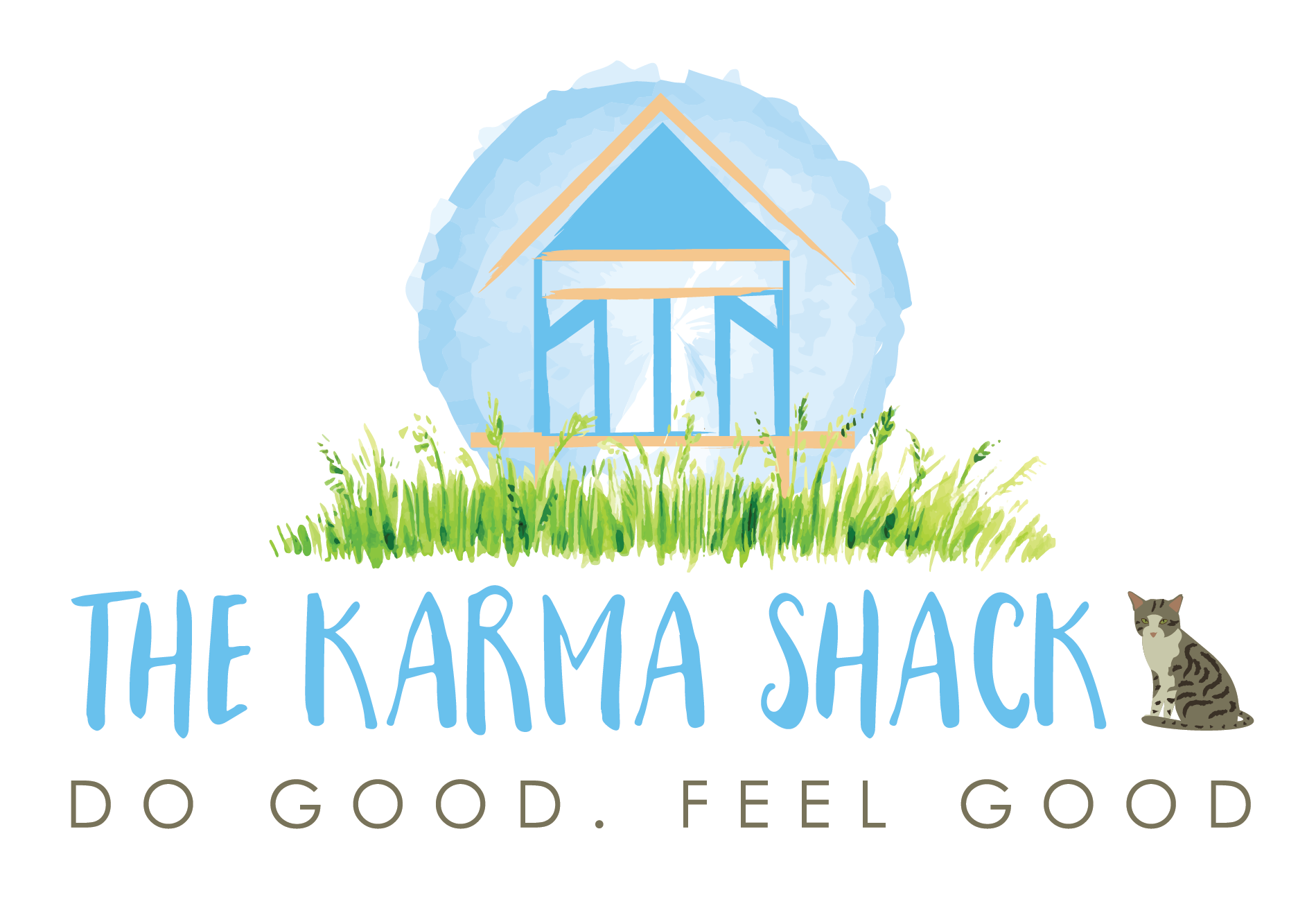
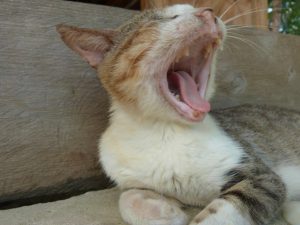 So under Karen’s nursing love and patience, you showed signs of getting better. You started to be able to use your legs again, which was amazing, after the way your spine had been twisted. On your own, without surgery, without pain killers, without physiotherapy, crutches or braces, you just started to use those skinny legs again, bit by bit. It made me wonder why an animal can do that, and we (Western?) humans think we are incapable of it. Then I realised that you can, because you have no other options. You don’t know about doctors and operations and pain killers, and that is why you don’t need them. You either get better and survive, or you die. That is nature in all its simplicity and beauty, God at work. In nature you don’t have prescription drugs that you will have to take every single day, thinking that otherwise you will be sick and suffering for the rest of your life. We humans do that, because we cling on to life, with all our might (which is in fact not so mighty at all), and the pharmaceutical industry makes sure that we believe that we need all their medicine to be able to survive. We cannot deal with discomfort, and most certainly not with the idea that life might be short. We are unwilling to accept life as it comes to us, with disease and injuries, that either heal or not. Basically, with medicine and operations, we are just trying to play God, aren’t we?
So under Karen’s nursing love and patience, you showed signs of getting better. You started to be able to use your legs again, which was amazing, after the way your spine had been twisted. On your own, without surgery, without pain killers, without physiotherapy, crutches or braces, you just started to use those skinny legs again, bit by bit. It made me wonder why an animal can do that, and we (Western?) humans think we are incapable of it. Then I realised that you can, because you have no other options. You don’t know about doctors and operations and pain killers, and that is why you don’t need them. You either get better and survive, or you die. That is nature in all its simplicity and beauty, God at work. In nature you don’t have prescription drugs that you will have to take every single day, thinking that otherwise you will be sick and suffering for the rest of your life. We humans do that, because we cling on to life, with all our might (which is in fact not so mighty at all), and the pharmaceutical industry makes sure that we believe that we need all their medicine to be able to survive. We cannot deal with discomfort, and most certainly not with the idea that life might be short. We are unwilling to accept life as it comes to us, with disease and injuries, that either heal or not. Basically, with medicine and operations, we are just trying to play God, aren’t we?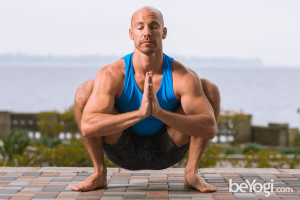
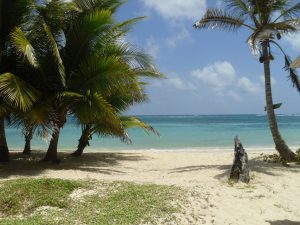

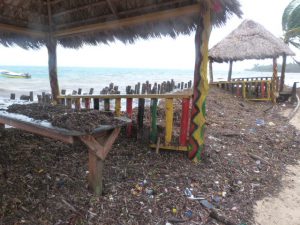 properties, so you will have to invest in your own costly shore protection if you want to keep your house from falling in the sea (I have no information about home insurance).
properties, so you will have to invest in your own costly shore protection if you want to keep your house from falling in the sea (I have no information about home insurance). ally cause cancer and all sorts of other horrible internal damage to your body. Long sleeves and long pants work relatively well, but are hot to wear in this climate. Mosquitoes may give you Dengue, Chikungunya or Zika, none of them very pleasant diseases, but you will survive. Bugs are part of tropical island life. Ants can get annoying too. They may invade your house, get into your delicious coconut bread that you saved as an after-party-snack, or just bite you while you stand around minding your own business. Spiders come in all sorts and sizes, and surprisingly it is one of the smallest ones that bites, while the big tarantulas and wolf spiders don’t really bother us. Still, if you are scared of spiders, you may regularly go through some difficult moments running into them, since you’re living in their territories on our tropical island. And the termites…well, they just eat your house, that’s all.
ally cause cancer and all sorts of other horrible internal damage to your body. Long sleeves and long pants work relatively well, but are hot to wear in this climate. Mosquitoes may give you Dengue, Chikungunya or Zika, none of them very pleasant diseases, but you will survive. Bugs are part of tropical island life. Ants can get annoying too. They may invade your house, get into your delicious coconut bread that you saved as an after-party-snack, or just bite you while you stand around minding your own business. Spiders come in all sorts and sizes, and surprisingly it is one of the smallest ones that bites, while the big tarantulas and wolf spiders don’t really bother us. Still, if you are scared of spiders, you may regularly go through some difficult moments running into them, since you’re living in their territories on our tropical island. And the termites…well, they just eat your house, that’s all.